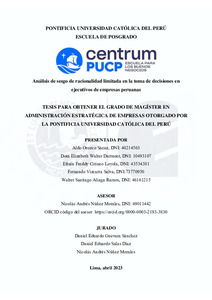| dc.contributor.advisor | Núñez Morales, Nicolás Andrés | |
| dc.contributor.author | Orozco Sáenz, Aldo | |
| dc.contributor.author | Walter Darmont, Dora Elizabeth | |
| dc.contributor.author | Cirineo Loyola, Efraín Freddy | |
| dc.contributor.author | Vizcarra Salva, Fernando | |
| dc.contributor.author | Aliaga Ramos, Walter Santiago | |
| dc.date.accessioned | 2023-05-19T15:52:57Z | |
| dc.date.available | 2023-05-19T15:52:57Z | |
| dc.date.created | 2023 | |
| dc.date.issued | 2023-05-19 | |
| dc.identifier.uri | http://hdl.handle.net/20.500.12404/24997 | |
| dc.description.abstract | La presente investigación describe y analiza la presencia del sesgo de racionalidad
limitada en la toma de decisiones en ejecutivos de empresas peruanas, a través de las variables de
niveles jerárquicos dentro de una organización, edad, sexo y área laboral, ello en un contexto de
distanciamiento social originada por el brote del virus COVID-19, escenario donde se limita las
actividades sociales fuera del entorno familiar. El presente estudio cuantitativo de alcance
descriptivo es no experimental, el cual se llevó a cabo entre el 1 de julio de 2022 y 31 de julio de
2022, a través de cinco preguntas aplicadas en un tiempo de 20 minutos por medio de la
plataforma google forms. Se recolectó 110 encuestas de ejecutivos peruanos pertenecientes a
diversos rubros empresariales. La influencia de cada variable fue evaluada independientemente
por medio de la prueba estadística ANOVA, con el fin de establecer diferencias entre los
diferentes colectivos. De las cuatro variables evaluadas, los resultados muestran diferencia
estadísticamente significativa en el nivel jerárquico, en los niveles jerárquicos más altos
(gerentes) se encuentran tomadores de decisiones con menor sesgo de racionalidad limitada, por
encima de los demás colectivos (jefes y supervisores). Con este resultado se puede recomendar a
las empresas invertir más tiempo y presupuesto en contratar gerentes con mejor capacidad en la
toma de decisiones. Por otro lado, si bien las variables de edad, sexo y área laboral no muestran
diferencia estadística significativa, estos resultados pueden respaldar otros estudios contra los
estereotipos de la sociedad sobre los ejecutivos tomadores de decisiones dentro de las empresas. | es_ES |
| dc.description.abstract | This research describes and analyzes the presence of limited rationality bias in decisionmaking in executives of Peruvian companies, through the variables of hierarchical levels
within an organization, age, sex and work area. This in a context of social distancing
caused by the outbreak of the COVID-19 virus, a scenario where social activities outside
the family environment are limited. The present quantitative study of descriptive scope is
non-experimental, which was carried out between July 1, 2022 and July 31, 2022,
through 5 questions applied in a time of 20 minutes through the google forms platform. .
110 surveys were collected from Peruvian executives belonging to various business
areas. The influence of each variable was evaluated independently by means of the
ANOVA statistical test, in order to establish differences between the different groups. Of
the four variables evaluated, the results show a statistically significant difference at the
hierarchical level, at the highest hierarchical levels (managers) there are decision makers
with less limited rationality bias, above the other groups (bosses and supervisors). With
this result, companies can be recommended to invest more time and budget in hiring
managers with better decision-making capacity. On the other hand, although the variables
of age, sex and work area do not show a significant statistical difference, these results can
support other studies against society's stereotypes about executive decision makers within
companies. | es_ES |
| dc.language.iso | spa | es_ES |
| dc.publisher | Pontificia Universidad Católica del Perú | es_ES |
| dc.rights | info:eu-repo/semantics/closedAccess | es_ES |
| dc.subject | Empresas--Perú | es_ES |
| dc.subject | Toma de decisiones | es_ES |
| dc.subject | COVID-19 (Enfermedad)--Perú | es_ES |
| dc.title | Análisis de sesgo de racionalidad limitada en la toma de decisiones en ejecutivos de empresas peruanas | es_ES |
| dc.type | info:eu-repo/semantics/masterThesis | es_ES |
| thesis.degree.name | Maestro en Administración Estratégica de Empresas | es_ES |
| thesis.degree.level | Maestría | es_ES |
| thesis.degree.grantor | Pontificia Universidad Católica del Perú. CENTRUM | es_ES |
| thesis.degree.discipline | Administración Estratégica de Empresas | es_ES |
| renati.advisor.dni | 49011442 | |
| renati.advisor.orcid | https://orcid.org/0000-0003-2193-3830 | es_ES |
| renati.author.dni | 40214563 | |
| renati.author.dni | 10493107 | |
| renati.author.dni | 43534381 | |
| renati.author.dni | 73770950 | |
| renati.author.dni | 46161215 | |
| renati.discipline | 413307 | es_ES |
| renati.juror | Daniel Eduardo Guevara Sánchez | es_ES |
| renati.juror | Daniel Eduardo Salas Díaz | es_ES |
| renati.juror | Nicolás Andrés Núñez Morales | es_ES |
| renati.level | https://purl.org/pe-repo/renati/level#maestro | es_ES |
| renati.type | https://purl.org/pe-repo/renati/type#tesis | es_ES |
| dc.publisher.country | PE | es_ES |
| dc.subject.ocde | https://purl.org/pe-repo/ocde/ford#5.02.04 | es_ES |






